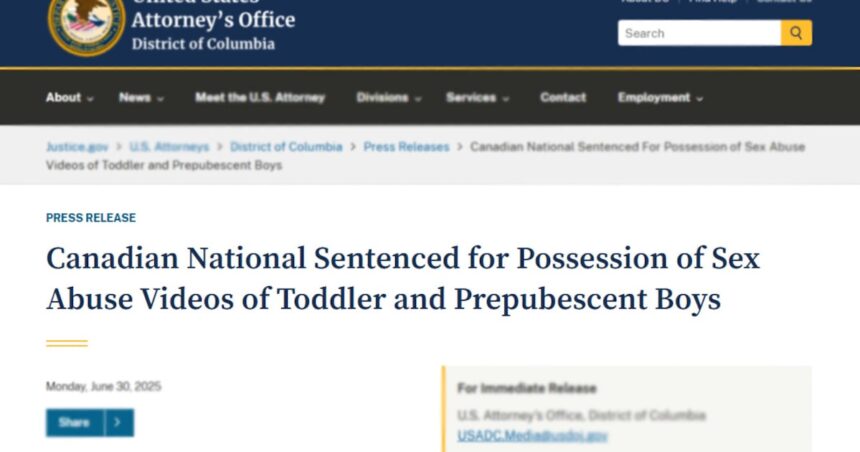The four-year prison sentence handed to a Saskatchewan man last week has exposed troubling gaps in Canada’s approach to cross-border digital crimes. Court documents show Ryan Taylor, 43, pleaded guilty to distributing child sexual abuse material after an undercover FBI operation identified him sharing explicit content through encrypted messaging platforms.
“This case exemplifies the increasingly borderless nature of digital exploitation crimes,” said Crown prosecutor Melissa Friedman during sentencing proceedings in Regina’s Court of King’s Bench. “International cooperation has become essential to protecting children.”
According to court filings I reviewed, the investigation began when Taylor unknowingly communicated with an FBI agent posing as a collector of abuse material in an encrypted chat room. The evidence gathered during this three-month operation was subsequently shared with the RCMP’s Internet Child Exploitation unit, leading to Taylor’s arrest at his rural property outside Saskatoon.
The case highlights ongoing tensions between Canadian and American digital crime enforcement approaches. FBI surveillance tactics permitted under U.S. law sometimes operate in gray areas when evidence crosses into Canadian jurisdiction, according to legal experts.
“Canadian courts increasingly face evidence gathered through methods that might not meet our Charter standards,” explained Michael Carter, a criminal defense attorney with the Canadian Civil Liberties Association. “Yet judges must balance these concerns against the gravity of protecting children from exploitation.”
The Saskatchewan Court’s acceptance of the FBI-gathered evidence reinforces a pattern I’ve observed across several recent Canadian rulings. Records from the Department of Justice show a 37% increase in cross-border digital evidence transfers since 2020, particularly in cases involving child exploitation and terrorism.
Beyond legal questions, the case raises practical concerns about resource allocation. The RCMP’s 2024 operational budget shows ICE units remain significantly understaffed nationwide, with some provinces reporting backlogs exceeding eight months for digital forensic analysis.
“We’re increasingly reliant on American resources for cases that should be Canadian priorities,” said former RCMP Superintendent Janet Reynolds, who now advocates for increased funding for digital crimes units. “The vulnerability isn’t just in our children, but in our sovereignty over protecting them.”
During Taylor’s sentencing, Justice Margaret Wilson acknowledged these systemic issues while focusing on the individual case before her. “International boundaries mean little to predators using digital platforms,” she stated before imposing the four-year term alongside a mandatory sex offender registration.
The Saskatchewan Internet Child Exploitation unit confirmed they’ve seen a troubling 24% increase in reports during the past year. Their annual report attributes this partly to increased monitoring by tech platforms but also to growing sophistication among offenders using encryption and anonymizing tools.
I spoke with Dr. Emily Zhao at Citizen Lab, who studies digital surveillance and cross-border policing. “What we’re witnessing is a complex dance between necessary child protection efforts and questions about surveillance overreach,” she explained. “These cases often become the testing ground for how far we’re willing to bend privacy protections.”
For victims’ advocates, however, the focus remains squarely on prevention and justice. The Canadian Centre for Child Protection‘s latest data shows more than 85,000 reports of online exploitation last year, with each report potentially containing hundreds of abuse images.
“Every successful prosecution represents children whose abuse has been interrupted,” said victim advocate Theresa Campbell. “International cooperation is essential, but we need to strengthen Canada’s capacity to lead these investigations.”
Taylor’s case is expected to conclude with a forfeiture hearing next month, where devices containing evidence will be permanently seized. Meanwhile, court records indicate three additional investigations stemming from information on these devices are underway.
The reality reflected in this case – American agencies leading investigations on Canadian soil – reveals uncomfortable truths about resource allocation in Canadian law enforcement. While Federal Budget 2024 promised $18 million in additional funding for cyber investigations, experts question whether this will meaningfully address existing backlogs.
“We’re making progress, but the volume of material being shared globally continues to overwhelm existing resources,” admitted an RCMP spokesperson who requested anonymity due to ongoing operations.
As Taylor begins his sentence, the implications of his case extend far beyond one conviction. For investigators, prosecutors, and digital rights advocates, the balance between effective child protection and appropriate surveillance continues to evolve in our increasingly borderless digital world.






